Grammar
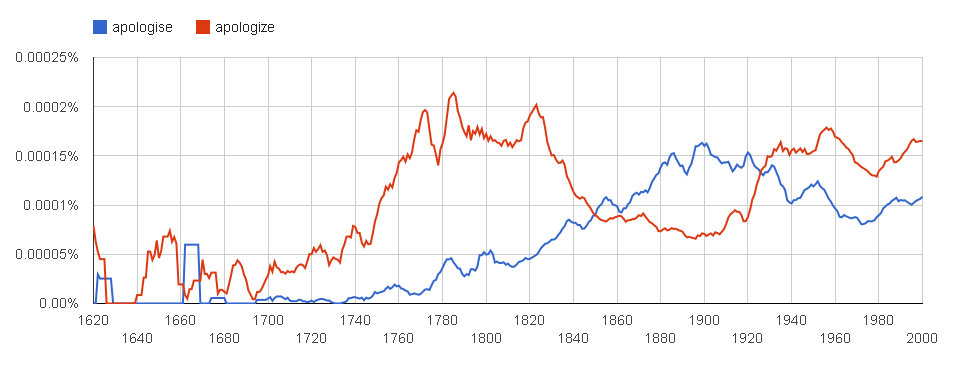
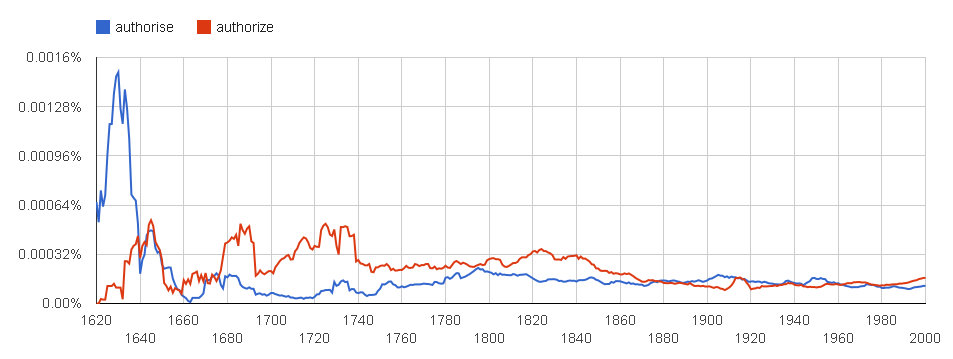
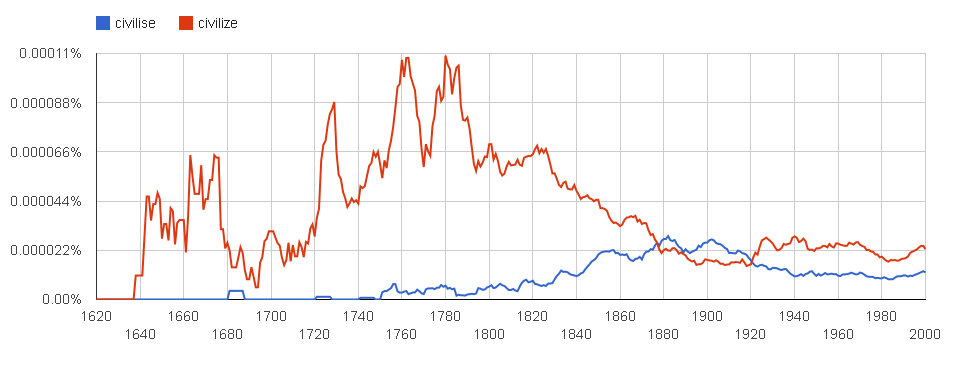
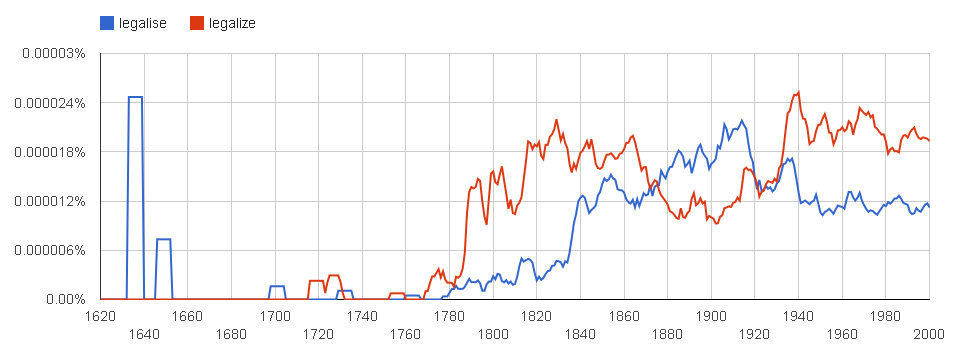
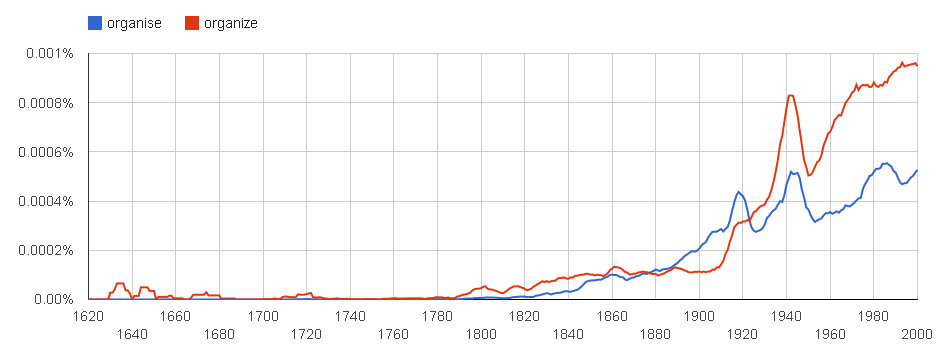
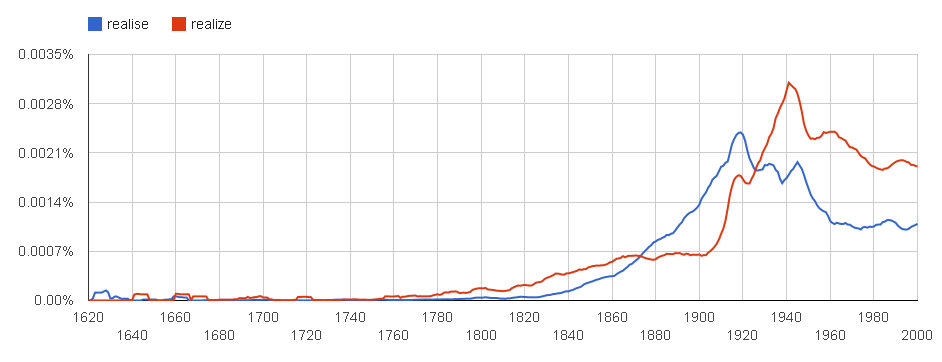
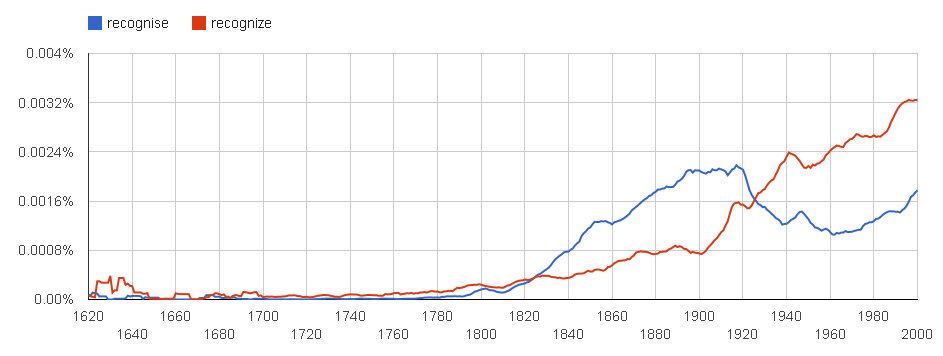
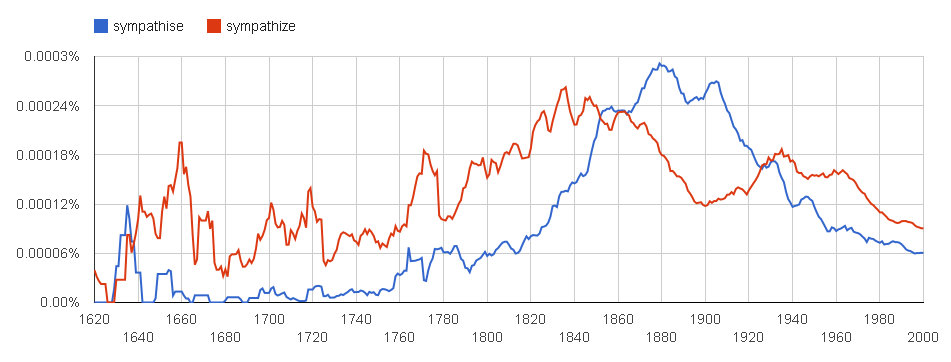
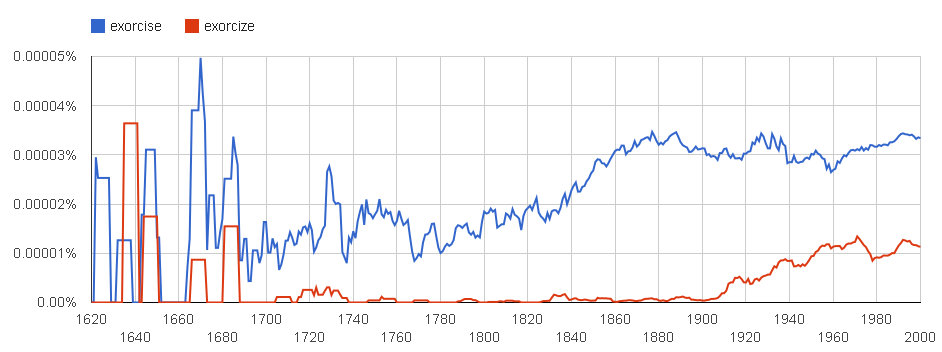
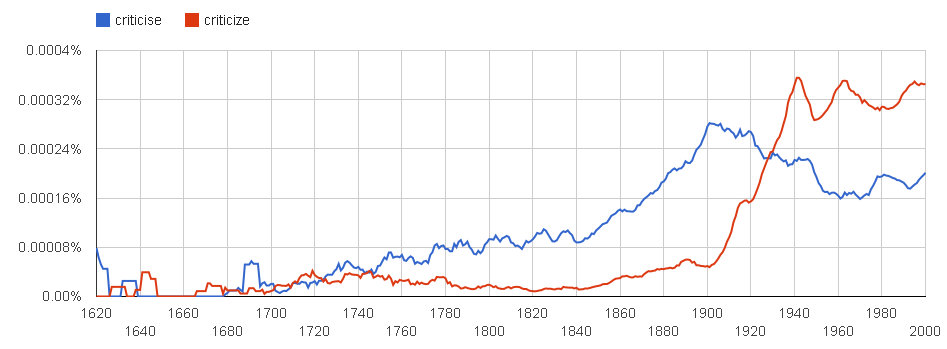
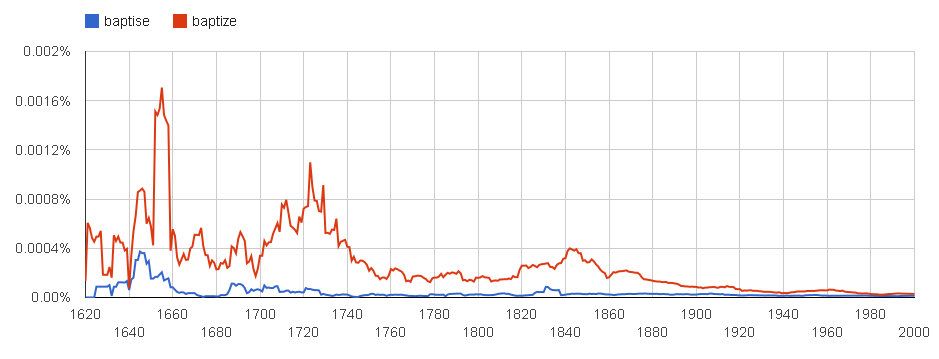
- Random-ise: Blackwood's Magazine, The Spelling Of -ize Suffix Verbs
This is part of an investigation I've been doing into the use and spelling of -ize suffix verbs and their spelling (-ize or -ise) in British English. For more details, related posts and the methods I've used, see the -ize / -ise page. For...
- Random-ise: Jonathan Swift, Ise And Ise Verbs
This is part of an investigation I've been doing into the use and spelling of -ize suffix verbs and their spelling (-ize or -ise) in British English. For more details, related posts and the methods I've used, see the -ize / -ise page. I'm...
- Random-ise: Congreve's The Way Of The World, -ize And -ise Verbs
This is part of an investigation I've been doing into the use and spelling of -ize suffix verbs and their spelling (-ize or -ise) in British English. For more details, related posts and the methods I've used, see the -ize / -ise page. ...
- Random-ised Thoughts - Tristram Shandy, -ize And -ise Verbs
This is part of an investigation I've been doing into the use and spelling of -ize suffix verbs and their spelling (-ize or -ise) in British English. For more details, related posts and the methods I've used, see the -ize / -ise page. ...
- Thackeray's Use Of -ise/-ize Verbs In Vanity Fair
In which I list all the instances of this type of verb in Mr. Thackeray's fine work and note certain inconsistencies in the spelling thereof, and do the same for Mr. Darwin and his Origin of Species. Background This is part of an investigation...
Grammar
Some random thoughts about -ise and -ize verbs in British English.
As a change from writing grammar exercises for foreign students, I've decided with this post to make a small contribution to the debate on the position of -ise/-ize verbs in Britain. It is rather long and quite detailed, and illustrated with lots of examples.
Verbs that can end in -ise or -ize
There is a large group of transitive verbs formed from nouns or adjectives which have a suffix with the sound /aɪz/. In American English these are always spelt with an -ize ending, but the standard position in British English is that they can be spelt with either -ize or -ise, depending on your fancy. Examples include:
| British English | American English |
| authorise / authorize | authorize |
| apologise / apologize | apologize |
| civilise / civilize | civilize |
| organise / organize | organize |
| realise / realize | realize |
| recognise / recognize | recognize |
These verbs can in turn be transformed into participal adjectives, such as civilised or civilized, and nouns, such as civilisation or civilization. There is a very good explanation of this at Dictionary.com (link below).
The -ise/-ize suffix is a very productive one, as it seems almost any noun can be turned into a transitive verb using it. More recent additions to the language include prioritise/prioritize from the noun priority, incentivise/incentivize from the noun incentive and finalise/finalize from the adjective final. Some people don't like some of these new verbs and this 'verbalisation' has been argued about for a long time, but that is not our concern here. What I'm interested in here is the relative positions of -ise and -ize endings in British English.
By British English I mean the varieties of English spoken in Australasia, parts of Africa, the Caribbean and India as well as in Britain itself. Although Canadians use British spellings in some cases, I think they're with the Americans on this one.
Depending on who you listen to, -ise endings seem to either be increasing in popularity in British English, or perhaps declining. If the latter is true, some people are inclined to see it as a result of American influence. If the former, others might see it as a statement of national identity, perhaps.
The debate
I imagine most British people are happy with the situation where we have a choice. But there are always some people around who like to tell other people what to do, especially where language is concerned, and there is some discussion about this on language blogs and forums. The most common positions seem to be:
- the-ize suffix is etymologically correct, so -ise endings should be avoided for these verbs.
- -ize endings are Americanisations so are to be avoided
Those putting forward the first view are no doubt correct about the etymology, although I believe it's a bit more complicated than that, and I'll be having a look at that later on. But in any case, etymology is not the only factor concerning correctness in language. If it were, lots of the words we use today would have different meanings, and we would be saying musea instead of museums, 'the data are interesting', etc.
And as we will see, those putting forward the second view are being historically inaccurate. As I hope to show, before the nineteenth century, -ize endings were the norm in both British and American English. I believe that there are perfectly good reasons for using -ise, but this is not one of them.
At the website Metadyne, in an article in favour of -ize endings punningly called 'The '-ize' have it', writer Mike Horne has 'a rant about the suggestion that the use of a 'z' in words like nationalization is somehow wrong or American.' I wholeheartedly agree with that sentence, but somewhat disagree with his conclusions. This post is intended as a response to his piece, which I'll come back to in a moment.
Some related non-controversial areas to get out of the way
In a few areas there is general understanding. In some cases British and American coincide, in others they differ, but there is no controversy over this. So we'll just have a quick look at these before we move on to the nitty-gritty.
Always -ise
There are a few verbs that always end in -ise in both American and British English. Here's what they say at Oxford Dictionaries Online
The main reason for this is that, in these words, -ise is part of a longer word element rather than being a separate ending in its own right. For example: -cise (meaning 'cutting') in the word excise; -prise (meaning 'taking') as in surprise; or -mise (meaning 'sending ') in promise.
These are always spelt -ise, in both British and American English. Many of them are based on the elements - cise, mise, prise, vise, which mainly come from French past participles, for example -mise from mettre/mis, -prise from prendre/pris.
| advertise | compromise | enterprise | revise |
| advise | demise | excise | supervise |
| apprise | despise | exercise | surmise |
| chastise | devise | improvise | surprise |
| circumcise | disenfranchise | incise | televise |
| comprise | disguise | merchandise | |
| enfranchise | prise |
As a way of distinguishing these from the suffix verbs we looked at first, I'll call these French-based -ise verbs and refer to the others, authorise, recognise etc, as -ise/-ize suffix verbs.
Always -ize
There are half a dozen or so words that always end in -ize, like seize, but as far as I know there are only two verbs with the /aɪz/ pronunciation:
| capsize | prize |
-yse/-yze verbs
These have the same pronunciation as the other two groups. They are always spelt -yse in British English, and -yze in American English
| analyse | catalyse | electrolyse | paralyse |
| breathalyse | dialyse | hydrolyse | psychoanalyse |
Metadyne - 'The '-ize' have it'
As we saw earlier, the writer of this piece, Mike Horne, starts off quite well, saying that it is 'a rant about the suggestion that the use of a 'z' in words like nationalization is somehow wrong or American.' And as we'll see, he's quite right there. However the article soon changes from being a defence of the use of -ize to being a veiled attack on those of us who prefer -ise. A couple of quotes will show what I mean:
The ‘s’ took hold in comparatively recent years because it was regarded as acceptable (because of the foregoing reason) and because of the hopelessness of training uneducated people correctly to grasp the correct occasion to deploy a ‘z’ or an ‘s’.
So we 'isers' are obviously uneducated and find it hard to grasp certain things.
I suppose even after being presented with the facts there will be people who will persist with the ‘s’ option, and that’s up to them. Nothing more I can do.
And no doubt we should be left to rot in our persistent ignorance.
As the use of the ‘s’ caught on, dictionaries had to follow the trend, and are now quoting it as ‘correct’. It is arguable, but dictionaries do not necessarily promote correct usage, but follow prevailing practice (which is then taken as correct, creating a spiral of decline).
And of course, it's all part of the Decline of the English Language As We Know It, as the philistines take over. But to be fair, perhaps we ought to look a bit closer at that 'foregoing reason'. Horne says:
The ‘s’ principally came into use by those believing it (apparently wrongly) to be correct by analogy with similar words that were current in French, when in fact the English use developed in parallel and came via Latin from the Greek, retaining the ‘z’ throughout (for example 'the realization' in English compares with ‘la réalisation’ in French) — in some quarters during the early days of English printing French [recently the language of the Anglo-Norman aristocracy] was regarded as posh;
There seems to be a bit of inconsistency here. At one point Horne says that the 's' has only become popular relatively recently, yet blames it on early printers, and possibly the Anglo-Norman aristocracy. He also goes on to say:
It seems to me that in books printed in England the use of the ‘z’ overwhelmingly predominated until the Second World War, though on a far smaller scale the ‘s’ can be found used by some printing houses, even in Victorian times.
Well, I'm definitely going to query that. What I want to do is look a bit at:
- the etymological arguments: where did these words come from?
- what has been the influence of French, and when. Was it thought 'posh', and did the Anglo-Norman barons have much to do with it?
- to what extent -ise endings have been used in British-published books, and when. How 'comparatively recent' has this development been?
- what is the situation today? Who uses -ise endings and to what extent?
- how is this dealt with by the most prestigious commentators on British English?
Etymological arguments
Unfortunately I don't have access to the OED, so I'm dependent on online dictionaries. The best ones for derivations seem to be the Online Etymology Dictionary (not surprisingly), The Free Dictionary (sometimes) and Collins Dictionary (sometimes).
This is from the Online Etymology Dictionary
-ize - word-forming element used to make verbs, Middle English -isen, from Old French -iser, from Late Latin -izare, from Greek -izein.
And from Dictionary.com:
< Late Latin -iza-re < Greek -izein; replacing Middle English -isen < Old French -iser < Late Latin
There is no dispute here. Everybody acepts that the verbs in question are ultimately derived from the Greek 'z' ending, via Latin, also with a 'z' ending. But how they got into English gets a bit more complicated:
English picked up the French form, but partially reverted to the correct Greek -z- spelling from late 16c. In Britain, despite the opposition (at least formerly) of OED, Encyclopaedia Britannica, the "Times of London," and Fowler, -ise remains dominant. Fowler thinks this is to avoid the difficulty of remembering the short list of common words not from Greek which must be spelled with an -s- (e.g. advertise, devise, surprise). (Online Etymology Dictionary)
Certain things seem to be clear:
- In Early and Middle English -isen was a standard verb ending
- Words were adopted into English, either from French or directly from Latin> Some were given M.E. -isen endings which later changed to -ise endings while others immediately adopted the French -ise ending
- In the great linguistic clean up round the turn of the 16th and 17th centuries, these were changed to -ize to reflect their Latin -izare and Greek -izein roots.
- But the -ise endings didn't die out altogether.
A few case studies
Two things should perhaps be made clear. Firstly, many of these verbs either entered English, or only began to be used, long after these principles had been set, simply adding -ise/-ize endings to existing English words, and not coming directly from French or Latin. Examples would seem to include apologise and legalise.
Secondly, these graphs represent use in a collection of British published books that have been digitised by Google. It doesn't include use outside books. I've started them at 1620 to exclude a huge spike in the first decade of the seventeenth century, presumably consisting mainly of Shakespeare, which would distort everything else.
apologise - 1590s, apology + -ize. Greek equivalent, apologizesthai (Online Etymology Dictionary)

authorise - entered Middle English in the 14th century as autorisen, from Old French autoriser (12c.). French in turn had got it from Medieval Latin auctorizare.

civilise - c.1600, from French civiliser, from Old French civil, from Latin civilis

legalise - 1710-1720, from legal + -ize

organise - early 15c., from Middle French organiser and directly from Medieval Latin organizare

realise - from the 1610s, from French réaliser

recognise - replacing late Middle English racunnysen, recognisen, from Old French reconuiss-, stem of reconuistre, which in turn came from the Latin recogno-scere

sympathise - c.1600; sympathy + -ize (Etymology Online)
1580–90; < Middle French sympathiser, equivalent to sympath ( ie ) sympathy + -iser -ize (Dictionary.com)

Conclusions
These rather reflect what had already become clear when we looked at the etymology in general.
- Some of these verbs came from French, some came from Latin, some came from both in parallel. And some were simply created from existing English nouns and adjectives.
- However these verbs started off life, -ize endings became much more common than -ise endings from very early on in the seventeenth century.
- There is a very clear pattern: -ize versions were dominant until about the middle of the nineteenth century or later, when the -ise versions took over in popularity, but which were themselves overtaken again by -ize sometime in the 1920s. This table shows the period for each verb when the -ise version was more common:
apologise 1850-1920 authorise 1890-1960 civilise 1875-1920 legalise 1870-1920 organise 1870-1925 realise 1870-1930 recognise 1830-1939 sympathise 1850-1930 - From the 1920s onwards -ize endings re-established themselves.
Why did -ize verbs eclipse -ise verbs once again? This is perhaps where the idea of Americanisation took hold. Perhaps people thought that this was due to American influence. For a couple of generations, -ise seems to have been the norm, so that when -ize began to reappear in the 1920s, it was perhaps seen as an interloper.
The strange case of exorcise, criticise and baptize
Exorcise and criticise are formed with the -ize/-ise suffix just like the verbs above, but it rather looks as though they've been associated with those other verbs ending in -cise which have come directly from French, like exercise and circumcise, which always take an 's'. Strangely, Oxford Dictionaries Online list exorcise under 's', while Oxford Advanced Learner's Dictionary lists it under 'z'. American dictionaries also seem to accept the 's' spelling here.
exorcise - 15th C. Middle English exorcisen, from Late Latin exorcizare, from Greek exorkizein

criticise - 1640s, from critic + -ize. (Online Etymology)

With baptise, however, the -ise spelling never really caught on at all.
baptise

The letter Z
As Scrabble players will know, the letter Z is probably the least used letter in the English alphabet. It originated with the Greek zeta. It had also existed in Latin, but had fallen out of use. From about 100BC, the letter Z was used exclusively in Latin with words of Greek origin.
We've seen that authorise and recognise entered English with -isen endings. One reason for this may be that they had no alternative. The letter Z simply didn't exist in Early English. The letter S was used for both unvoiced an voiced sybilants (soft and hard S)
Ironically, English got Z from French, but at the beginning it was used to represent a different sound. This is from Etymology Dictionary Online:
Z - not a native letter in Old English; in Anglo-French words it represents the "ts" sound (e.g. Anglo-French fiz, from Latin filius, modern Fitz); from late 13c. it began to be used for the voiced "s" sound and had fully taken that role by 1400.
The French Connection
In his Metadyne piece, Horne says that:
in some quarters during the early days of English printing French [recently the language of the Anglo-Norman aristocracy] was regarded as posh.
Let's look at the French angle first, and then have a quick look at early printing. There were really two French Connections, the Norman one from 1066, and a later fashion for French in England in the thirteenth century.
And it should be remembered that during nearly all of this time, the really posh language was neither English nor French, but Latin. The most famous document of the Conquest period, Domesday Book, was written in Latin, not French.
Although we got some loan words from Norman French, especially in the field of religion and religious architecture, linguists believe the second period to have had a greater effect on the English language. We seemed to have got the words beef and mutton, for example, not from the Normans, but from 13th century French. This was a time when Paris represented the peak of European culture. Here's David Crystal:
But it was a new kind of French, learned in a new kind of way. The Anglo-Norman variety, which had been the mother-tongue of the power-wielding class after the Conquest, had by this time virtually died out, to be replaced by a more prestigious variety, the language of the French court ... This was the key to social advancement. - The Stories of English
French was also replacing Latin as the language of official documents; parliamentary records were in French. It wouldn't be till 1362 that Parliament was addressed in English.
And as regards the -ise/-ize suffix, this was hardly a matter of French versus English, where the function of the letter Z was still being settled, but of French versus Latin. In any case, the Ngram graphs suggest that the real rise in the use of the -ise variant wouldn't come till much, much later, in the mid-to-late eighteenth century. Was French posh then? That's the important question.
The early days of printing
Caxton brought printing to England in 1476. In fact, this was the very time that English was replacing French as the prestige language in England. Caxton printed 80% of his books in English, the first one being The Canterbury Tales.
By the time printing arrived in England, the -ize ending was well established even if the use of -ise/-ize suffix verbs was still very rare. As for the Anglo-Norman aristocracy, they were long gone, and if French had ever been thought posh, it had had very little to do with them.
Many of the early printers adopted a form of English known as Chancery Standard. Quite a few documents from the period in this form are available free online and might be worth looking at. I've had a quick glance but didn't see any -ise/-ize suffix verbs in two documents I looked at.
But as the -ize variant seems to be have continued its dominance for another couple of centuries, I don't think early printers can have had much to do with it.
Books
Introduction
Google Books is an excellent resource, but has a couple of problems. As most of the books have been digitized in the States, you have to make sure you find a British published edition, and as near as possible to the original publication date, as fashions change and -ze might get changed to -ise and vice-versa. The second problem is that it allows for exact word search only.
So for out of copyright books, I do my preliminary search on Project Gutenberg, looking for -ized and -ised words only. This is much quicker than going through every instance of -ise and -ize.
There are links near the end of this post to most of the examples I've found so you can check for yourself.
Middle English
Middle English covers the period between the late 12th and the late 15th centuries and corresponds roughly with the era of the Plantagenet kings (1154–1485). It is largely pre-printing, as Caxton introduced printing to England in 1476.
The great work of Middle English is of course Chaucer's Canterbury Tales. While there are plenty examples of French-based -ise verbs such as advise, disguise, surprise and chastise, I can't find one example of an -ise/-ize suffix verb.
Early Modern English
In the Faery Queene 1590-96, Edmund Spencer used at least four -ise/-ize suffix verbs: moralize, solemnize, eternize , baptize, all spelt with a 'z' in the original version. Interestingly he also spells the following with a 'z' as well: advise, wise, surprise, devise.
From the early seventeenth century, the master works are of course the King James Bible and Shakespeare. Although there are quite a lot of instances of French -ise verbs like surprise, advise, chastise and in the bible, an awful lot of circumcising, examples of -ize/-ise suffix verbs are extremely rare.
As far as I can see, the only one in the bible is baptize.
Update I initially underestimated the number of -ize/-ise words in Shakespeare. There are variations on about thirty verbs, including such delights as annothanize, eterniz'd, infamonize, monarchize and sluggerdiz'd as well as the more standard authorized, solemnized, merchandized, sympathized and canonized. In both the King James Bible and Shakespeare, -ize endings are used throughout.
Post Commonwealth 17th century
From the later part of the century we have Pepys' Diary, which has a few examples of -ize verbs. Milton's Paradise Lost has three verbs with -ize spellings - tyrannize, evangelize and eternize. He also spells enterprise and surprise as enterprize and surprize. As far as I can see, John Bunyan uses only one - authorize, again with a 'z' ending.
The picture from the seventeenth century, therefore, is one of total domination by -ize, as we might have expected from what we've already seen.
18th century
Gulliver's Travels, first published in 1726, had a few instances of 'civilized' and one of 'familiarized'. These appear to have had -ize endings in the original. In an edition of 1826, some have remained with a Z, some have changed to S.
Samuel Johnson published his famous dictionary in 1755. There are probably between 60 and 80 examples of -ise/-ize verbs, including agonize, fertilize, legalize, pulverize, tantalize, villanize, all spelt with a 'z'. (NB Update I had initially only found three. Johnson uses apostrophes to mark stressed syllables, and these have been included in the digitised version, making search a bit difficult). Interestingly even Johnson gets a bit confused, listing characterize but using characterize in a definition. In one early version I looked at the following were listed with an S: realise, recognise, dastardise There are also plenty of examples of the French -ise type verbs.
Sterne's Tristram Shandy of 1759 heralds a change. Sterne includes words like subtilized, soliloquized and genteelized as well as the more commom baptized and civilized. French-based -ise verbs also appear with a Z: surprized, apprized.
19th century
The nineteenth century seems to have been in many ways the heyday of the -ise ending. Nearly all the British published books of the period I've been able to find favour the -ise ending. First editions of Charlotte Bronte's Jane Eyre, Dicken's David Copperfield and Engels'and Marx's Communist Manifesto all had -ise endings.
It seems that especially in the nineteenth century, many of the greatest works of literature in English first saw the light of day with -ise endings. Of course we don't know if that was the authors' choice or something dictated by the publishing houses. But in one case we can get a good idea, because the author and publisher were one and the same person, Charles Dickens, who published his novel Hard Times in his own magazine - Household Words. And on the first page we find the word emphasised.
Conclusions
One thing is clear. Whether they ended with -ize or -ise, these suffix verbs were much slower to appear in English than the group of French -ise verbs like surprise, disguise and chastise, which are quite common in earlier works like Shakespeare and the King James Bible.
The -ise/-ize suffix verbs only really began to appear in any numbers towards the end of the eighteenth century.
It seems the that Horne's suggestions that -ise endings 'took hold in comparatively recent years', or that the use of -ize endings 'overwhelmingly predominated until the Second World War' are not quite accurate. For much of the nineteenth century, -ise endings predominated, and it was just before the Second World War that -ize made a comeback.
Magazines
The Internet Library of Early Journals has searchable collections from five different British eighteenth and nineteenth century magazines. I've looked at three. This is what the ILEJ say about them:
Annual Register started in 1758, an annual survey of European and world events from a British perspective, but including biographical notices, parliamentary and legal reports, and some book reviews, divided into topical sections with chronological sub-divisions. (Collection spans 1758-1778)
Blackwood's Edinburgh Magazine started in 1817 (as a Tory rival to the Whig Edinburgh Review), a medium for imaginative literature, publishing English poetry, essays and especially prose fiction, and pioneering the presentation of European literature (particularly German) to a British audience. (Collection spans 1843-1863)
Notes and Queries started in 1849, "a medium of intercommunication for literary men, artists, antiquaries, genealogists, etc.", carrying brief reports of completed research on humanities and related subjects and questions inviting answers in subsequent issues. (Collection spans 1849-1869)
| Verb | Annual Register | Blackwood's | Notes & Queries | |||
| -ise | -ize | -ise | -ize | -ise | -ize | |
| apologise | 2 | 158 | 15 | 106 | 1 | |
| authorise | 2 | 236 | 34 | 653 | 41 | |
| civilise | 5 | 971 | 134 | 118 | 9 | |
| legalise | 28 | 6 | 27 | 1 | ||
| organise | 491 | 53 | 491 | 53 | ||
| realise | 987 | 129 | 262 | 17 | ||
| recognise | 1 | 2087 | 85 | 810 | 5 | |
| sympathise | 351 | 28 | 53 | 1 | ||
The first thing to note is how rare -ize/-ise suffix endings are in the eighteenth century publication, and how common they have become in the nineteenth century ones. Blackwood's seem to have had an open policy, and here -ise variants are by far the majority. I suspect that Notes and Queries had an -ise house policy.
Here we have two of the most important literary and cultural magazines of the nineteenth century, where -ise endings are obviously predominant. This simply supports the evisence we have from book publishing.
What's the position today?
The media
A quick check with Google shows that most British newspaper, including all the qualities, and the BBC seem to use -ise endings, The Guardian and The Economist specifying them in their style guides. The Times used to use -ize, but has switched to -ise, although its subsidiary, The Times Literary Supplement, is in the -ize camp.
The Oxford University Press
The main proponents of the -ize variant are the people at the OUP. Most Oxford publications use -ize endings, and the principal entries for these verbs in Oxford dictionaries are under -ize endings. Cambridge, however, follows -ise endings.
The Scientific and technical press.
Many scientific and technical magazines, including Nature, opt for the -ize endings, perhaps bacause of their international audiences.
People in general
According to Wikipedia the ratio of -ise use to -ize use is 3:2 in the UK, but in Australia it's 3:1.
The British National Corpus
So I checked with the (simple version) of the British National Corpus. This is an enormous collection of 100 million words taken from all sorts of sources. It has been organised by Oxford University and is used by, for example, the Oxford Advanced Learner's Dictionary. There is one small problem in that 10% of the corpus is from spoken sources and it is difficult to know whether these have been recorded as -ise or -ize, but a quick glance suggests that both are used, depending on who made the recordings, so they shouldn't skew the figures too much.
The figures show the numbers of instances of each word in the corpus, and their respective ratios. If we take the Wikipedia ratio of 3:2 and turn it into a multiplication factor we get 1.5, which seems not far removed from what these BNC figures show overall, if perhaps a bit conservative.
| Ratios - is to -iz | -e | -ed | -ation | ||||||
| Verb | -ise | -ised | -isation | -ize | -ized | -ization | |||
| apologise | 572 | 361 | - | 284 | 130 | - | 2.01 | 2.78 | |
| authorise | 211 | 1033 | 268 | 100 | 443 | 148 | 2.11 | 2.33 | 1.81 |
| civilise | 14 | 463 | 603 | 14 | 338 | 719 | 1.0 | 1.37 | 0.84 |
| legalise | 25 | 56 | 45 | 29 | 85 | 48 | 0.86 | 0.66 | 0.94 |
| organise | 1251 | 3908 | 8294 | 817 | 2428 | 6297 | 1.53 | 1.61 | 1.32 |
| realise | 3800 | 4713 | 682 | 2133 | 2869 | 548 | 1.78 | 1.64 | 1.24 |
| recognise | 3581 | 5121 | - | 2067 | 3072 | - | 1.86 | 1.67 | - |
| sympathise | 159 | 51 | - | 80 | 52 | - | 1.99 | 0.98 | |
There are a couple of interesting points to notice here. Firstly, there is some variation between verbs, and secondly that the bias to 's' is less marked in 'ation' words.
Conclusion
Far from being associated with 'uneducated people', -ise would appear to be the preferred form of the majority of the educated classes in Britain, or at least of the publications they like to read. It would be interesting to try and do a breakdown of who uses which, but that's well beyond the scope of this post.
Why the discrepancy with Ngram?
It seems strange that while nearly all newspapers have opted for -ise endings, -ize still seems to have a strong lead in published books. This might be an area for further investigation.
What the usage guides say.
Probably the two most famous and influential writers of style guides for British English were Henry W. Fowler and Sir Ernest Gowers.
Henry W. Fowler - A Dictionary of Modern English Usage
This has become, for many people, the standard usage guide. Fowler was against pedantry, but manages to appeal to prescriptivists and descriptivists alike. The second and third editions became progressively descriptivist.
- The First Edition 1926, by Fowler himself
- The Second Edition 1965, edited by Sir Ernest Gowers
- The Third Edition 1996, edited by R.W.Burchfield
Sir Ernest Gowers - The Complete Plain Words
This was first published 1954 and has also seen two subsequent editions
- The First Edition 1954, by Gowers himself
- The Second Edition 1973, edited by Sir Bruce Fraser
- The Third Edition 1986, edited by Sydney Greenbaum and Janet Whitcut
This is a quote from Gowers in The Complete Plain Words
On the question whether verbs like organise and nouns like organisation should be spelt with an s or a z the authorities differ. There are some verbs (e.g. advertise, comprise, despise, advise, exercise and surmise) which are never spelt with a z in this country. There are others (such as organize) for which many people, particularly if they have had a classical education, prefer a z; but the latest authorities incline to the view that in these cases s is permissible. This being so, the simplest course is to use an s in all cases, for that will never be wrong, whereas z sometimes will be. But do not condemn those who use a z in its right place.
In the second edition, Gowers's revisor, Sir Bruce Fraser, adds a note:
Fowler's more austere view was that ize should always be used where the verb has been formed by using the suffix equivalent to the Greek suffix -izein (which retained its z when Latinised), but that ise should continue to be always used for words such as those quoted above which have been formed in a different way. Gowers specifically rejected this view in The Complete Plain Words but allowed it to stand in his revised edition of Fowler's Modern English Usage. His first, more permissive view is, I think, clearly preferable. I cannot regard realise or Latinise as wrong. B.D.F.
So we know from this that in the original edition of A Dictionary of Modern English Usage, Fowler was strongly against -ise endings, on etymological grounds. And that in the second edition, Gowers, whatever his personal views, upheld Fowler's original position.
But in the Third Edition, The New Fowler's, editor R.W. Burchfield has moved away from Fowler's position, and although he accepts that all these verbs ultimately came from Greek via Latin, he points out that the way they came into English was often rather more complicated. And he concludes:
The primary rule is that all words of the type authorize/authorise, civilize/civilise, legalize/legalise may be legitimately be spelt with either -ize or -ise throughout the English-speaking world except in America, where -ize is compulsory.
Request!
If anyone reading this has a first or second edition Fowler and a few spare minutes, I would be very grateful to know exactly what he wrote - it's listed under -ize. Perhaps you could let me know in the Comments below. I'd also be interested to know if anyone had raised objections to -ise use before Fowler.
A note on Oxford English
The publications of the Oxford University Press have their own usage policy, sometimes referred to as Oxford English.
- Where an -ize ending is possible, they use it.
- Where the -ise ending is compulsory, they obviously use that.
- Where the choice is between -yze and -yse, they go for -yse
So they combine elements of both British and American practice. Oxford English is one of the working languages at the United Nations. The European Union, on the other hand, have opted for '-ise English'.
The American / British angle
First, -ize endings are not Americanisms, they started life in England well before anybody sailed to America.
On the other hand, just when the -ise endings were becoming popular in Britain in the early 19th century, Noah Webster plumped for -ize endings in his famous An American Dictionary of the English Language, in 1828. The seeds for divergence had been sown on both sides of the Atlantic.
After a long period of -ise dominance in Britain, when -ize started to become popular again just before the Second World War, this may have been seen by some as due to American influence. It's a line perhaps worth pursuing.
The -ise ending is undoubtedly seen as a characteristic part of British English, both within Britain and beyond.
The Phonetic argument
I have seen the argument put forward that we should all use -ize endings to make English more phonetic. But in that case, logically we should do the same with the French-based -ise verbs like surprise etc, in which case we'd lose the etymological distinction again. And in any case would involve a major spelling reform, which just ain't goin' to happen.
In fact, this is quite a good argument for using -ise endings, as for us -isers all three groups of /aɪz/ verbs are pronounced the same: -ise/ize suffix verbs, French-based -ise verbs, and -yse verbs like analyse. There are only a few words with an -ise ending, like promise and premise, that are not pronounced /aɪz/.
Unanswered questions
I've only just scratched the surface here, and I think there are several questions still to be answered:
- Why was there a revival of the -ise version in the nineteenth century after -ize had seemed to become the norm three hundred years earlier?
- Why did -ize then make a comeback in the 1920s? Was it perhaps in response to Fowler's criticism?
- Has there been another swing towards -ise in the last few years?
- Is -ise use increasing or declining?
- Is there a difference between use in books and use in newspapers, private correspondence etc?
But in the course of writing this, I have discovered something of the wealth of materials that are available on the Internet, and that are really worth exploring more, especially in the field of original texts and facsimiles.
A possible theory for the rise in the use of the S ending.
We've seen that the -ize ending predominated until the mid-to-late eighteenth century. There are a couple of other factors we should also take into account.
First, the use of these -ise/-ize sufix verbs seems to have been very rare before that time. On the other hand, the use of the French-based -ise verbs had been extremely common, right from early on in Middle English. And as we have seen, sometimes these were even written with a Z, so it's possible that not a lot of distinction was made between them. Because ot the rarity of the -ise/-ize sufix verbs, the issue had hardly existed before the eighteenth century.
It is perhaps not surprising that when the use of -ise/-ize sufix verbs began to increase rapidly in the second half of the eighteenth century, people used a form of spelling they were already very familiar with. I imagine the etymological arguments started to be made at this time or later, not back in the fourteenth and fifteenth centuries.
Book references - Early Modern English
Edmund Spencer - The Faery Queene
moralize - solemnize - rizeThe King James Bible 1611 (400th anniversary facsimile)
baptizedShakespeare
There are variations on about thirty verbs, all with -ize endings. Here are a few examples:
Facsimile versions from the First Folio (1623) and First Quarto (1600)
- Sonnet 102 - That love is merchandized, whose rich esteeming,
- Love's complaint - His rudeness so with his authorized youth
- Othello Act IV Scene I - An unauthorized kiss
- Macbeth Act III Scene IV - Authorized by her grandam. Shame itself!
- The Tempest Act V Scene 1 - Of these our dear-belov'd solemnized
- Love's Labour's Lost Act II Scene I - Of Jaques Falconbridge, solemnized
- Comedy of Errors Act IV Scene I (at bottom right)That by this sympathized one day's error
- Henry VI Part 2, Act I Scene II Are brazen images of canonized saints.
Book references - Post Commonwealth 17th century
Samuel Pepys Diary 1660-1669 (1893 edited by Henry B Wheatley, London)
surprized - baptized - particularized - solemnized - frizedJohn Milton - Paradise Lost (London 1733)
tyrannize - evangelize - eternizeJohn Bunyan - Pilgrim's Progress (Facsimile of First Edition)
authorizedBook references - 18th century
Gulliver's Travels 1726 facsimile
civilizedGulliver's Travels 1726 (London 1826)
civilized - civilised - familiarizedSamuel Johnson - Dictionary 1755 (Edinburgh 1797)
authorize - realize - sympathizeDaniel Defoe - The Life and Surprising Adventures of Robinson Crusoe 1719 (London 1834)
naturalized - realizedHenry Fielding - The History of Tom Jones, a Foundling 1749 (London 1806)
recognised - authorised - civilisedLawrence Sterne - The Life and Opinions of Tristram Shandy, Gentleman 1759 (London 1832)
solemnized - baptized - subtilized - uncrystalized - harmonizedCook's Voyage 1775 (1893)
recognised - realisedBook references - 19th century
Jane Austen - Pride and Prejudice 1816 (London 1853)
apologised - authorised - realisedKarl Marx and Friedrich Engels - The Communist Manifesto 1848 (1975 with original text)
monopolised - civilised - equalisedCharlotte Bronte - Jane Eyre 1848 (Original Volume III)
recognised - tyrannise - exorcisedCharles Dickens - David Copperfield 1850 - Bradbury and Evans Original 1850
recognised - apologised - emphasised - immortalizedCharles Dickens - Hard Times 1849 (facsimile PDF)
emphasise (second paragraph)George Eliot - Middlemarch 1871-72 (illustrated bt AA Dixon 1930s)
recognised - symbolised - characterisedRelated posts
Update
I've started posting more details, about specific books and authors etc. An overview of this little project and a list of related posts can be found at my -ize / -ise page.
Links - The debate
- Oxford Dictionaries Online - the basic rules
- Dictionary.com - the story of -ize
- Wikipedia - Spelling differences between British and American English
- Metadyne - The ‘-ize’ have it!
- Kate Grady at Translation Directory
Internet tools
- Google Ngram Viewer
- Google Books
- Project Gutenberg
- British National Corpus
- About the BNC - OALD
Useful resources
- British Library Timeline
- The Internet Archive
- The Open Library
- The Internet Public Library
- Internet Library of Early Journals
- The Internet Shakespeare
- Dickens - Stanford
- Samuel Johnson's Dictionary
The letter Z
- The History of Z
- Dictionary.com - Z
- Online Etymology Dictionary
Wikipedia
- A Dictionary of Modern Usage
- The Complete Plain Words
Search for 'recognised' at the five quality British newspapers and the BBC.
- The Guardian
- The Independent
- The Times Search
- The Telegraph
- Financial Times Search
- BBC News
Other links worth a look
- A Dictionary of Printers and Printing (London 1839) - By Charles Henry Timperley
- Anthology of Chancery texts
- Gladly Wolde He - Chancery Standard
loading...
- Random-ise: Blackwood's Magazine, The Spelling Of -ize Suffix Verbs
This is part of an investigation I've been doing into the use and spelling of -ize suffix verbs and their spelling (-ize or -ise) in British English. For more details, related posts and the methods I've used, see the -ize / -ise page. For...
- Random-ise: Jonathan Swift, Ise And Ise Verbs
This is part of an investigation I've been doing into the use and spelling of -ize suffix verbs and their spelling (-ize or -ise) in British English. For more details, related posts and the methods I've used, see the -ize / -ise page. I'm...
- Random-ise: Congreve's The Way Of The World, -ize And -ise Verbs
This is part of an investigation I've been doing into the use and spelling of -ize suffix verbs and their spelling (-ize or -ise) in British English. For more details, related posts and the methods I've used, see the -ize / -ise page. ...
- Random-ised Thoughts - Tristram Shandy, -ize And -ise Verbs
This is part of an investigation I've been doing into the use and spelling of -ize suffix verbs and their spelling (-ize or -ise) in British English. For more details, related posts and the methods I've used, see the -ize / -ise page. ...
- Thackeray's Use Of -ise/-ize Verbs In Vanity Fair
In which I list all the instances of this type of verb in Mr. Thackeray's fine work and note certain inconsistencies in the spelling thereof, and do the same for Mr. Darwin and his Origin of Species. Background This is part of an investigation...
